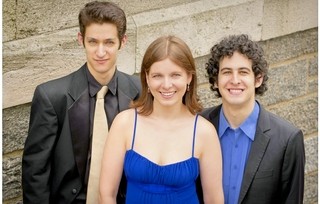|
Back
The Youths’ Magic Strings New York
Weill Recital Hall, Carnegie Hall
04/03/2014 -
Dmitri Shostakovich: Piano Trio No. 1, Opus 9
Jakub Ciupinski: The Black Mirror (World Premiere)
Franz Schubert: Adagio in E-flat Major “Notturno”, Opus 148, D. 897
Johannes Brahms: Piano Trio No. 2 C Major, Opus 87
John Musto: Piano Trio
Concert Artists Guild Artists in New York: Lysander Piano Trio: Liza Stepanova (Piano), Itamar Zorman (Violin), Michael Katz (Cello)

The Lysander Piano Trio (© Richard Blinkoff)
The three young members of the Lysander Trio claim that their name comes from the character in Midsummer Night’s Dream, but I don’t believe it for a moment. Nothing in their work, which merges enthusiasm with technical control, could be inspired by that lovesick second-hand Romeo. I would imagine instead that their Lysander was the namesake of the valiant Spartan commander who could never be defeated.
The Lysander Trio, though, had a program which was anything but Spartan. Usually the name “piano trio” summons up the earliest Beethoven, the most uninteresting Mozart. But the Lysander Trio eschewed those commonplaces for two modern works (both composers were present), the unearthly single movement by Schubert, and an almost unknown piece by Shostakovich.
In fact, for those who believe the Russian composer rose fully created, like Venus from the waves, the C Minor Piano Trio, written when he was 17 years old, long before the First Symphony which gave him international fame, is a revelation. I had never heard the one-movement work before, but the first measures were pure solemn Shostakovich. After this came more conservative music, stuff which breathed of Arensky and Glazunoff. But the composer’s confidence never left him, and those haunting first measures were repeated again.
If this was a short sign of evolution, the Lysander Piano Trio played it fully formed, with the kind of vitality and enthusiasm which perhaps can only be found in such a highly talented group.
The next three works gave further evidence of their talents. What ‘the Shostakovich was for the young composer was the following “Notturno” for a Schubert near death. Perhaps no mere instrumentalists can reach the right apogee for this utterly perfect theme, and Lysander seemed to be in a bit of a hurry, to rush through the supplementary themes.
But the next two works by a middle-aged and young composer gave them back that unique young sound. In fact, while John Musto’s Trio was written 14 years ago, the music swings back to Broadway Bernstein, to New York jazz, to a syncopated romp.
Here above all the three showed their technical mojo. Pianist Liza Stepanova had music which could have been played by Oscar Peterson, playful piano-playing which always reached its mark, while the two Israelis, Itamar Zorman and Michael Katz, had that all-American spirit which Mr. Musto gave them.
The contrast to this was a work, commissioned by Concert Artists Guild and the National Endowment for the Arts by a young Polish-born composer whose name was new to me, Jakub Ciupinski. His title, The Black Mirror was not out of the Brothers Grimm or Harry Potter, but (in his words), “a portable painting aide of the late 18th Century, a compact mirror with a blackened surface..to capture vast landscapes into a size of a small canvas...”
This aside, the piece was of an indefinably original structure. Mr. Stepanova started with a nine-note infinitely repeatedtheme but with both minuscule and maximal changes throughout the 13 minutes. Over that slowly came Mr. Zorman’s luscious Guarneri violin, and over that cellist Michael Katz at first imitated and then overlay the theme with sounds that sounded part like a theremin, part like a the mewings of a contented feline.
Nothing was aggressive, nothing in this work shouted out its originality, but the whole idea was arresting, haunting, and in its own way absolutely gorgeous.
The only “normal:” work closed the program, Brahms’ Opus 87 Trio, which, with such performers, can’t really fail. Granted, after the other music, it did feel a bit...er...bourgeois, with a smidgeon of the smug composer who bragged to his publisher about its beauty.
Yet it is indeed a perfectly lovely piece, and was played with love by these three.
The encore was truly special. Moshe Zorman, father of the violinist, is a noted composer himself, and his own Trio was offered. Under ordinary circumstances, one would accuse the musicians of pure nepotism. In this case, such a jaunty series of tunes, which probably were Hebrew but sounded Turkish, were played with delightful gusto. It was a fitting tribute form son to father, and in essence, from artists to their audience.
Harry Rolnick
|